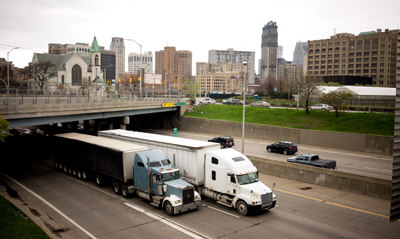A report from Public Sector Consultants concluded Michigan has a $3.9 billion annual funding shortfall to fix roads and bridges.
At a press conference March 7, leaders from Michigan’s road-building industry and business community gathered to share their reactions to the new report.
“This report makes it crystal clear that it’s time to take our infrastructure funding crisis seriously,” said Rob Coppersmith, executive vice president of the Michigan Infrastructure & Transportation Association. “The data speaks for itself. Michigan faces an annual funding shortfall of $3.9 billion, and that is even with the funding from the governor’s bonding program and the federal infrastructure plan dollars included. There will be a day coming in the not-too-distant future when those funds will dry up, but our need will only continue to grow.”
The PSC report examined the overall cost of maintaining Michigan's road network, the current road funding estimates, the revenue sources for funding roads, and the potential options for raising additional revenue to close the funding gap.
“Michigan’s prosperity, competitiveness and quality of life depend on modern, reliable infrastructure,” said President & CEO of the Michigan Chamber of Commerce Jim Holcomb. “This infrastructure is what connects us, allows our businesses and our economy to grow and thrive, and creates countless opportunities for our communities and families. The time is now for a bipartisan, long-term strategy with solutions and investments that improve our roads and bridges. We can’t afford to wait.”
In 2016, a state commission estimated Michigan needed to invest an additional $2.2 billion in roads and bridges annually. This report found Michigan’s transportation system needs are higher than previous estimates and that spending to maintain and rehabilitate roads is more cost-effective than waiting until a lane mile has reached the end of its design life when reconstruction becomes the only option.
Additionally, MDOT assessments of Michigan road conditions show 33% of all federal-aid roads and 45% of non-federal-aid roads are in poor condition and should be reconstructed in the next two years. The report found reconstruction is five to eight times more expensive per lane mile than preventative maintenance.
“The motoring public has suffered enough,” said Association of Michigan Deputy and Legislative Director Ed Noyola. “With the infusion of electric vehicles, now more than ever, it’s time for our legislative leaders to focus on long-term transportation funding, including a pilot mileage-based tax that will move Michigan toward a new and fair system of revenue collection for EVs.”
The report suggested four revenue options to fix the roads.
- Increase the motor fuel tax
- Increase the motor fuel tax and assess the motor fuel tax on a per-dollar basis so that taxes and tax revenue increase (or decrease) when the price increases (or decreases)
- Increase and change the apportionment of the sales tax for transportation
- Allow local governments to charge their own sales taxes to meet specific needs like transportation
In 2017, Michigan’s gas tax increased slightly to $.263 per gallon for both gas and diesel, increasing the total motor fuel tax revenue by 34.3%, or $347.2 million. Additionally, Michigan will receive a one-time funding allocation of $7.3 billion from the federal Infrastructure Investment and Jobs Act, and the 2019 Rebuilding Michigan Program provided $3.5 billion in one-time bond funding for state and federal roads.
However, these are one-time funds and are restricted to fixing certain roads. These leaders say the state needs continual investments. Even if Michigan spends its $9 billion surplus to fix the roads, it would only fund about two years of road funding, according to this report.
In 2019, Gov. Gretchen Whitmer pitched a 45-cent gas tax hike to fix the roads, which lawmakers rejected.









